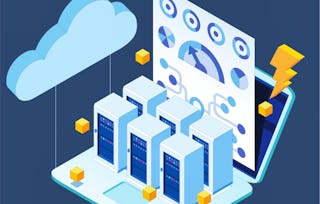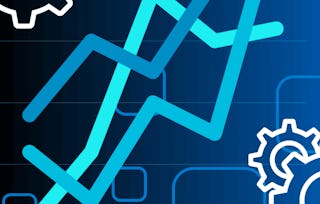Throughout this course, you'll explore virtualization, containerization, and Kubernetes, mastering the very tools that power data engineering in the industry. Each week presents a new set of tools and platforms that are indispensable in data engineering. From mastering Docker and Kubernetes to exploring advanced topics such as AI-driven coding with GitHub Copilot, efficient container image management with Azure and Amazon Elastic Container Registries, and Site Reliability Engineering (SRE) practices, you'll go beyond the basics and acquire the expertise needed to thrive in the dynamic and data-driven landscape of advanced data engineering. Whether you're a current student looking to expand your skills or a working professional aiming to take your expertise to the next level, this course is tailored to equip you with the advanced knowledge and hands-on experience necessary for success.
即将结束: 只需 199 美元(原价 399 美元)即可通过 Coursera Plus 学习新技能。立即节省

Virtualization, Docker, and Kubernetes for Data Engineering
本课程是 Applied Python Data Engineering 专项课程 的一部分



位教师:Noah Gift
5,900 人已注册
包含在 中
您将学到什么
Master virtualization, containerization, and Docker, including Dockerfile creation and multi-container orchestration with Compose and Airflow.
Develop expertise in Kubernetes core concepts, cluster architecture, and deployment using cloud environments, GitHub Codespaces, and AI-driven tools.
Navigate data scenarios mastering containerization, deploying apps, and addressing production issues with cloud orchestration and SRE practices.
您将获得的技能
要了解的详细信息

添加到您的领英档案
38 项作业
了解顶级公司的员工如何掌握热门技能

积累特定领域的专业知识
- 向行业专家学习新概念
- 获得对主题或工具的基础理解
- 通过实践项目培养工作相关技能
- 获得可共享的职业证书

该课程共有4个模块
In this module, you will learn about the fundamentals of virtualization, exploring its various aspects such as hardware utilization and scaling applications. You will start by understanding what virtualization is and delve into the concept of virtual machines. Through the introduction of Virtual Box and a hands-on demo, you will gain a practical understanding of how virtual machines work and their benefits. Additionally, you will explore container concepts, focusing on Docker as a key containerization tool. Through an introduction to Docker and its architecture, you will learn how to scale applications using containers, providing a comprehensive overview of virtualization and its practical applications. To apply your newfound knowledge, you will be assessed through a series of hands-on exercises involving the creation and management of virtual machines and containers, demonstrating your ability to effectively utilize virtualization technologies.
涵盖的内容
8个视频9篇阅读材料8个作业1个讨论话题
In this module, you will learn how to effectively work with the Docker client, create volumes, and run databases in containers, gaining hands-on experience in managing containerized applications. You will also explore how to use the Docker command line for tasks such as building images and working with Dockerfiles, enabling you to package your software efficiently. You'll get a chance to study real-life Dockerfile examples and consult the Dockerfile reference for best practices. Furthermore, you will dive into orchestration with Docker Compose, learning how to manage multi-container applications using Compose. As an extension to this, you will be introduced to Airflow, a workflow management platform, and learn how to integrate it with Docker Compose for a seamless automation experience.
涵盖的内容
9个视频6篇阅读材料8个作业
In this module, you will embark on a comprehensive journey into Kubernetes, the cornerstone of modern container orchestration. You'll begin by grasping Kubernetes key concepts, cluster architecture, and service deployments. The advantages of cloud development environments, exemplified by GitHub Codespaces, will become more clear as you explore GitHub's ecosystem and harness AI-driven coding with GitHub Copilot and OpenAI Codewhisper. The module culminates in hands-on experience as you deploy Kubernetes using Minikube within GitHub Codespaces. Gain a solid foundation in Kubernetes essentials and the power of cloud-based development, setting the stage for successful containerized application management and collaborative coding in the modern era.
涵盖的内容
14个视频7篇阅读材料8个作业
This module immerses you in the hands-on world of Kubernetes solutions. You'll start by mastering containerization, constructing FastAPI microservices, and deploying containerized applications using Azure Container Registry and Amazon Elastic Container Registry. Next, explore options for cloud-based container orchestration, featuring Google Cloud Run and AWS Copilot, and expand your coding horizons in AWS Cloud9. Finally, address critical production issues as you delve into load testing, monitoring systems, the SRE mindset for MLOps, and the art of operationalizing microservices. This module offers a comprehensive toolkit to navigate Kubernetes in real-world scenarios, combining theory and practice to prepare you for Kubernetes success.
涵盖的内容
13个视频8篇阅读材料14个作业
获得职业证书
将此证书添加到您的 LinkedIn 个人资料、简历或履历中。在社交媒体和绩效考核中分享。
从 Machine Learning 浏览更多内容
 状态:免费试用
状态:免费试用Duke University
 状态:预览
状态:预览 状态:免费试用
状态:免费试用Duke University
 状态:免费试用
状态:免费试用
人们为什么选择 Coursera 来帮助自己实现职业发展




学生评论
45 条评论
- 5 stars
51.11%
- 4 stars
13.33%
- 3 stars
13.33%
- 2 stars
8.88%
- 1 star
13.33%
显示 3/45 个
已于 Feb 18, 2024审阅
It was great but the last module of week 4 felt isolated from the rest of the course.
已于 Mar 19, 2025审阅
For the first time I really understood what "virtualization" is and how things sort of expand for larger and larger units. Really solid stuff on CI/CD stuff also.
常见问题
To access the course materials, assignments and to earn a Certificate, you will need to purchase the Certificate experience when you enroll in a course. You can try a Free Trial instead, or apply for Financial Aid. The course may offer 'Full Course, No Certificate' instead. This option lets you see all course materials, submit required assessments, and get a final grade. This also means that you will not be able to purchase a Certificate experience.
When you enroll in the course, you get access to all of the courses in the Specialization, and you earn a certificate when you complete the work. Your electronic Certificate will be added to your Accomplishments page - from there, you can print your Certificate or add it to your LinkedIn profile.
Yes. In select learning programs, you can apply for financial aid or a scholarship if you can’t afford the enrollment fee. If fin aid or scholarship is available for your learning program selection, you’ll find a link to apply on the description page.
更多问题
提供助学金,



